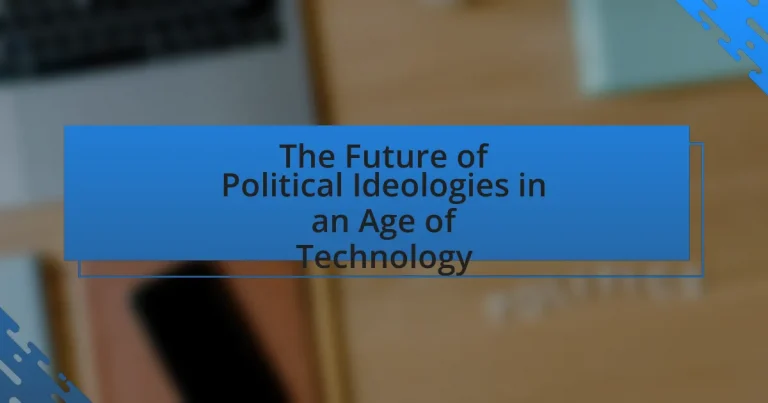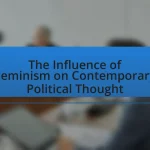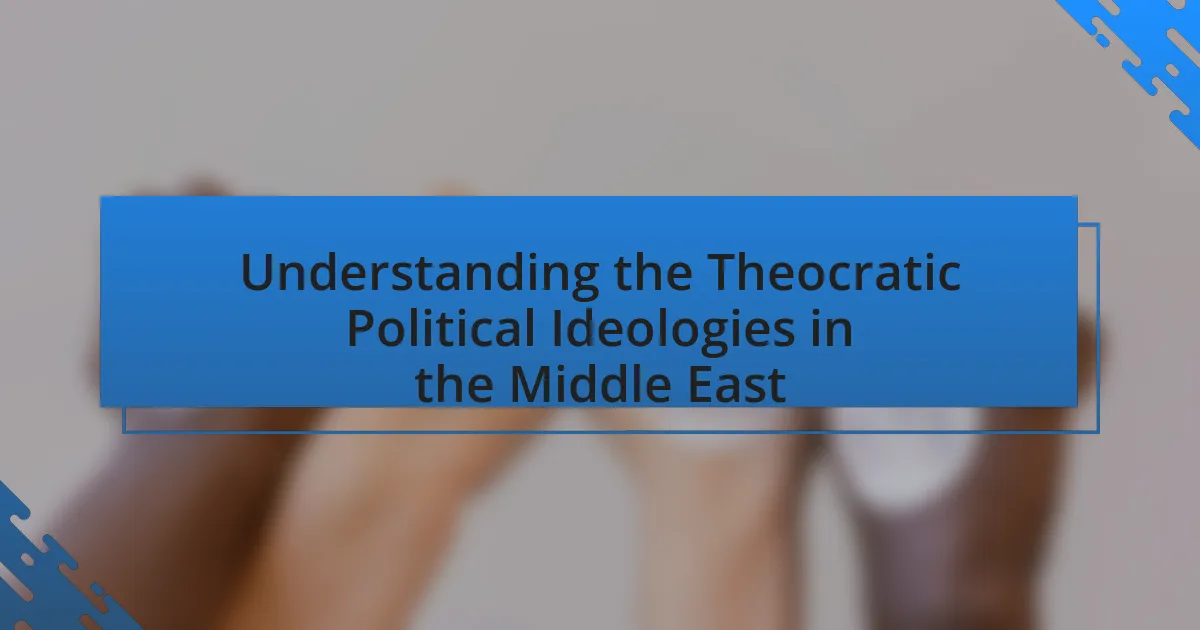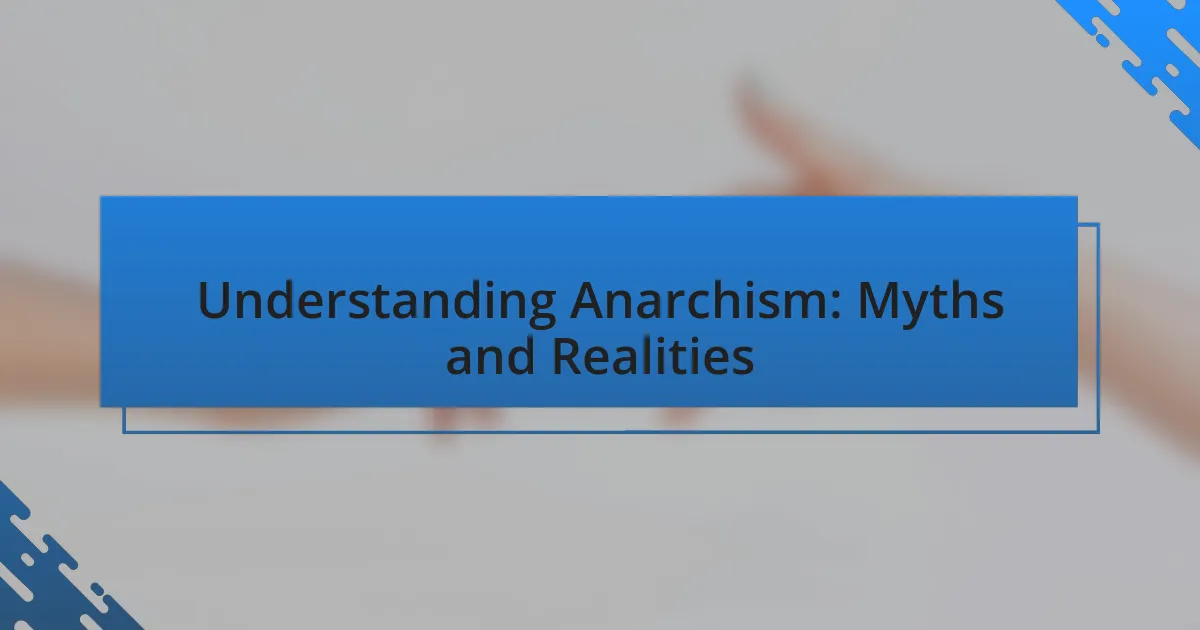The article examines the evolving landscape of political ideologies in the context of technological advancements. It explores how frameworks of beliefs and values shape societal perceptions and utilization of technology, influencing policies on privacy, surveillance, and digital rights. Key discussions include the historical impact of technologies like the printing press and social media on political thought, the role of artificial intelligence and big data in shaping political campaigns, and the emergence of new ideologies such as digital populism and eco-socialism. Additionally, the article addresses the implications of misinformation, blockchain technology, and the need for digital literacy in fostering healthy political discourse in an increasingly polarized environment.
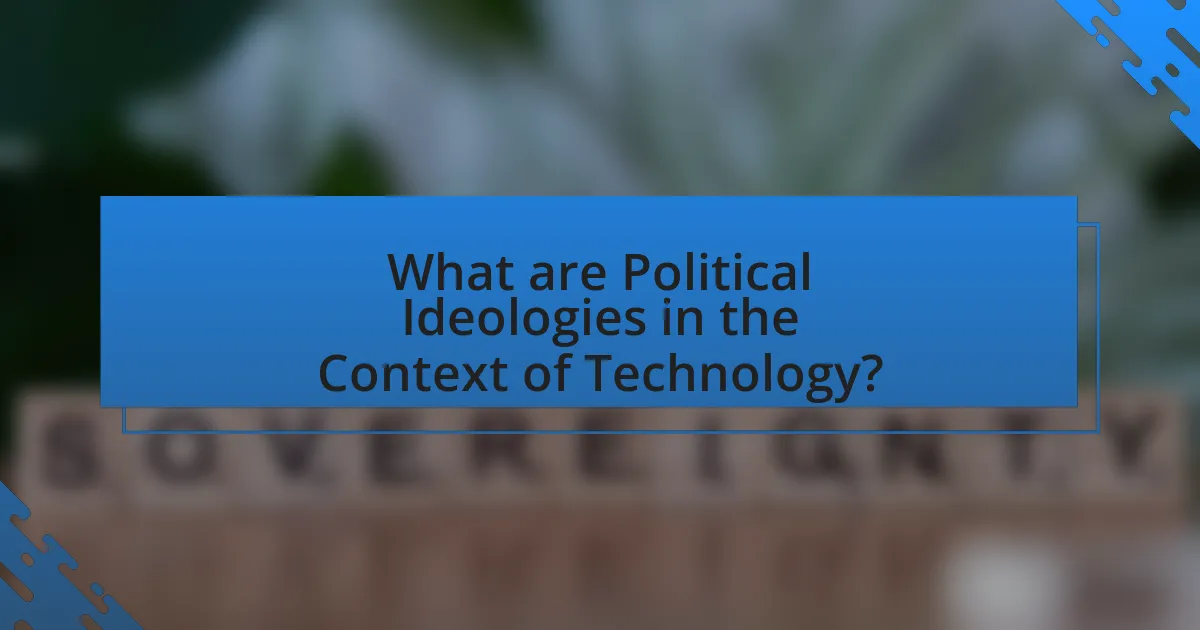
What are Political Ideologies in the Context of Technology?
Political ideologies in the context of technology refer to the frameworks of beliefs and values that shape how societies perceive and utilize technology. These ideologies influence policies regarding technology development, regulation, and access, impacting areas such as privacy, surveillance, and digital rights. For instance, liberal ideologies often advocate for individual freedoms and privacy rights in technology use, while authoritarian ideologies may prioritize state control and surveillance over personal privacy. The rise of digital platforms has also led to new ideological debates, such as those surrounding data ownership and the ethical implications of artificial intelligence. These ideological perspectives are critical in shaping the future landscape of technology and its integration into society.
How have political ideologies evolved with technological advancements?
Political ideologies have evolved significantly with technological advancements, primarily through the influence of communication technologies and data analytics. The rise of the internet and social media has transformed how political messages are disseminated, allowing for rapid mobilization and grassroots movements, as seen in events like the Arab Spring. Additionally, data analytics has enabled political campaigns to target specific demographics more effectively, shaping ideologies to resonate with particular voter segments. For instance, the use of big data in the 2012 U.S. presidential election allowed campaigns to tailor their messages based on voter behavior and preferences, illustrating a shift towards more personalized political engagement. These advancements have led to the emergence of new ideologies that prioritize digital rights and privacy, reflecting the changing landscape of political discourse in the digital age.
What historical examples illustrate the impact of technology on political thought?
The invention of the printing press in the 15th century significantly impacted political thought by facilitating the spread of ideas, leading to the Reformation and the rise of individualism. This technology allowed for the mass production of pamphlets and books, enabling thinkers like Martin Luther to disseminate their critiques of the Church widely, which challenged established authority and contributed to the development of modern democratic thought. Additionally, the advent of the telegraph in the 19th century transformed political communication, allowing for real-time reporting of events and fostering a more informed electorate, which was crucial during pivotal moments such as the American Civil War. These examples illustrate how technological advancements have historically shaped political ideologies and public discourse.
How do technological changes influence the formation of new ideologies?
Technological changes significantly influence the formation of new ideologies by altering communication methods, access to information, and social interactions. For instance, the rise of the internet and social media has enabled rapid dissemination of ideas, allowing grassroots movements to gain traction and challenge established norms, as seen in the Arab Spring. Additionally, advancements in artificial intelligence and data analytics have shifted political discourse, leading to ideologies that prioritize data-driven decision-making and transparency. Historical examples, such as the impact of the printing press on the Reformation, illustrate how technology can catalyze ideological shifts by empowering individuals and fostering new ways of thinking.
What role does technology play in shaping public opinion and political discourse?
Technology significantly influences public opinion and political discourse by facilitating the rapid dissemination of information and enabling diverse platforms for dialogue. Social media platforms, such as Twitter and Facebook, allow users to share opinions, mobilize support, and engage in discussions, which can shape perceptions and influence political outcomes. For instance, a study by the Pew Research Center found that 64% of Americans believe social media has a significant impact on their political views. Additionally, algorithms used by these platforms can create echo chambers, reinforcing existing beliefs and polarizing public opinion. This dynamic illustrates how technology not only amplifies voices but also shapes the narrative surrounding political issues, ultimately affecting democratic processes and civic engagement.
How do social media platforms affect political ideologies?
Social media platforms significantly influence political ideologies by facilitating the rapid dissemination of information and enabling targeted communication. These platforms allow users to share opinions, mobilize support, and engage in discussions, which can reinforce existing beliefs or introduce new perspectives. For instance, research conducted by the Pew Research Center in 2020 found that 53% of social media users reported that these platforms have influenced their political views. Additionally, algorithms on platforms like Facebook and Twitter often create echo chambers, where users are primarily exposed to content that aligns with their pre-existing beliefs, further entrenching ideological divides. This phenomenon has been linked to increased polarization in political discourse, as evidenced by studies showing that users are more likely to engage with content that provokes strong emotional responses, often leading to more extreme viewpoints.
What is the impact of misinformation on political beliefs in the digital age?
Misinformation significantly alters political beliefs in the digital age by shaping perceptions and influencing voter behavior. Studies indicate that exposure to false information can lead to the reinforcement of existing biases, as individuals are more likely to accept misinformation that aligns with their pre-existing views. For instance, research published in the journal “Science” by Vosoughi, Roy, and Aral in 2018 found that false news spreads more rapidly on social media than true news, affecting public opinion and political polarization. This dynamic creates echo chambers where individuals are isolated from opposing viewpoints, further entrenching their beliefs and complicating the democratic process.
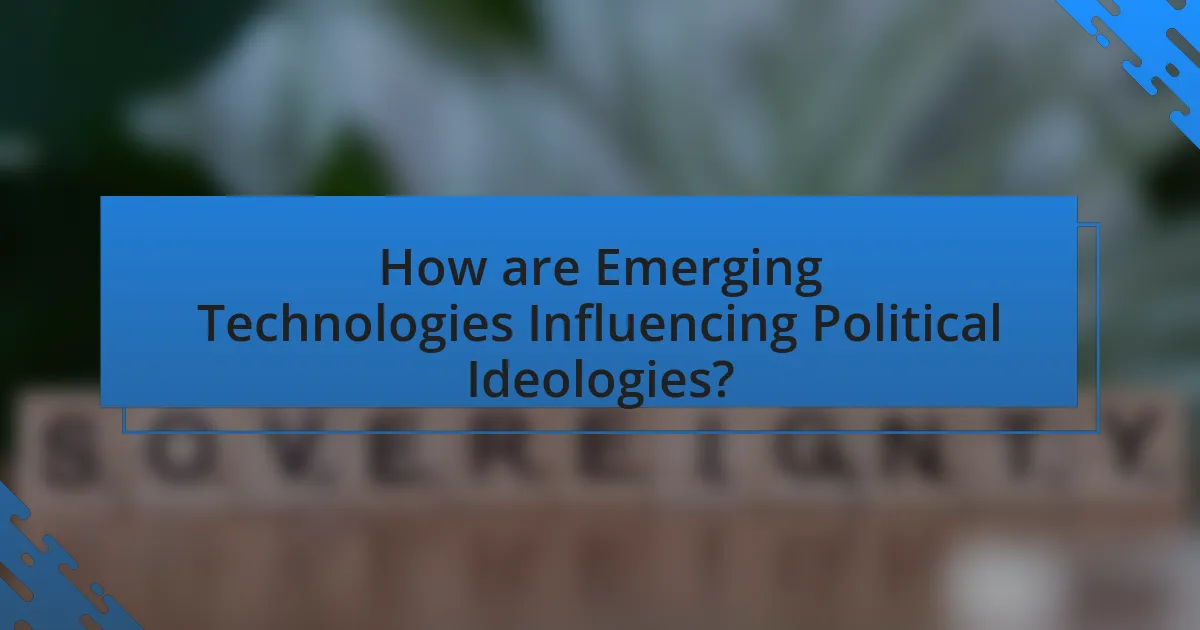
How are Emerging Technologies Influencing Political Ideologies?
Emerging technologies are significantly influencing political ideologies by reshaping communication, information dissemination, and public engagement. Social media platforms, for instance, have transformed how political messages are shared, allowing for rapid mobilization of grassroots movements and the spread of alternative viewpoints, which can challenge traditional political narratives. A notable example is the Arab Spring, where social media played a crucial role in organizing protests and disseminating information, leading to significant political changes in several countries. Additionally, the rise of artificial intelligence and data analytics has enabled political campaigns to target voters more effectively, tailoring messages to specific demographics, which can reinforce existing ideologies or create new political alignments. This shift in strategy is evidenced by the use of data-driven approaches in the 2016 U.S. presidential election, where targeted advertising influenced voter behavior. Overall, emerging technologies are not only altering the landscape of political communication but also redefining the ideologies that emerge from these new forms of engagement.
What technologies are currently reshaping political landscapes?
Artificial intelligence, social media, blockchain, and big data analytics are currently reshaping political landscapes. Artificial intelligence enhances data-driven decision-making and voter targeting, as seen in campaigns utilizing machine learning algorithms to analyze voter behavior. Social media platforms, such as Twitter and Facebook, facilitate rapid information dissemination and grassroots mobilization, significantly influencing public opinion and political discourse. Blockchain technology offers transparency in voting processes, as demonstrated by pilot projects in various countries aiming to secure electoral integrity. Big data analytics enables political parties to tailor their strategies based on comprehensive voter insights, evidenced by the use of data analytics firms in recent elections to optimize campaign efforts.
How does artificial intelligence affect political decision-making?
Artificial intelligence significantly influences political decision-making by enhancing data analysis, improving predictive modeling, and facilitating targeted communication. AI systems can process vast amounts of data from social media, public opinion polls, and demographic information, allowing political leaders to make informed decisions based on real-time insights. For instance, during the 2016 U.S. presidential election, AI-driven analytics were used to identify voter preferences and tailor campaign messages, demonstrating AI’s role in shaping electoral strategies. Furthermore, AI algorithms can predict election outcomes and policy impacts, providing politicians with tools to assess the potential consequences of their decisions. This integration of AI into political processes raises ethical considerations regarding transparency and accountability, as reliance on automated systems may obscure the decision-making process.
What role does big data play in political campaigning and ideology?
Big data plays a crucial role in political campaigning and ideology by enabling targeted messaging and voter engagement strategies. Political campaigns utilize vast amounts of data collected from various sources, including social media, surveys, and voter registration databases, to analyze voter behavior and preferences. For instance, during the 2012 U.S. presidential election, the Obama campaign effectively used big data analytics to identify and mobilize key voter demographics, resulting in a significant increase in voter turnout. This data-driven approach allows campaigns to tailor their messages to resonate with specific audiences, thereby shaping political ideologies and influencing public opinion.
How do new technologies challenge traditional political ideologies?
New technologies challenge traditional political ideologies by altering communication, information dissemination, and civic engagement. For instance, social media platforms enable grassroots movements to mobilize quickly, undermining established political structures and traditional party systems. The Arab Spring exemplifies this, where social media played a crucial role in organizing protests against authoritarian regimes, demonstrating how technology can empower citizens and disrupt conventional power dynamics. Additionally, the rise of digital misinformation complicates the political landscape, as it can distort public perception and challenge the credibility of traditional news sources, further destabilizing established ideologies.
What are the implications of blockchain technology for governance?
Blockchain technology has significant implications for governance by enhancing transparency, accountability, and efficiency in public administration. The decentralized nature of blockchain allows for secure and immutable record-keeping, which can reduce corruption and increase trust in governmental processes. For instance, Estonia has implemented blockchain for e-governance, enabling secure digital identities and transparent voting systems, which have improved citizen engagement and reduced fraud. Additionally, smart contracts can automate and enforce agreements without intermediaries, streamlining bureaucratic processes and reducing costs. These advancements indicate that blockchain can fundamentally transform how governments operate, fostering a more participatory and transparent political environment.
How does the rise of digital currencies impact economic ideologies?
The rise of digital currencies significantly impacts economic ideologies by challenging traditional monetary systems and promoting alternative economic models. Digital currencies, such as Bitcoin and Ethereum, operate on decentralized networks, which undermines the central banking system’s control over monetary policy. This shift encourages a more libertarian economic ideology that values individual autonomy and reduced government intervention in financial transactions.
Moreover, the adoption of digital currencies fosters the emergence of new economic frameworks, such as decentralized finance (DeFi), which aims to create an open-source financial ecosystem that operates independently of traditional financial institutions. This transition is evidenced by the rapid growth of DeFi platforms, which saw total value locked increase from $1 billion in early 2020 to over $80 billion by late 2021, illustrating a significant shift in how economic transactions are conceptualized and executed.
As digital currencies gain traction, they also prompt discussions around the implications for monetary sovereignty and the role of state-backed currencies, potentially leading to a reevaluation of Keynesian and monetarist economic theories that have dominated for decades.
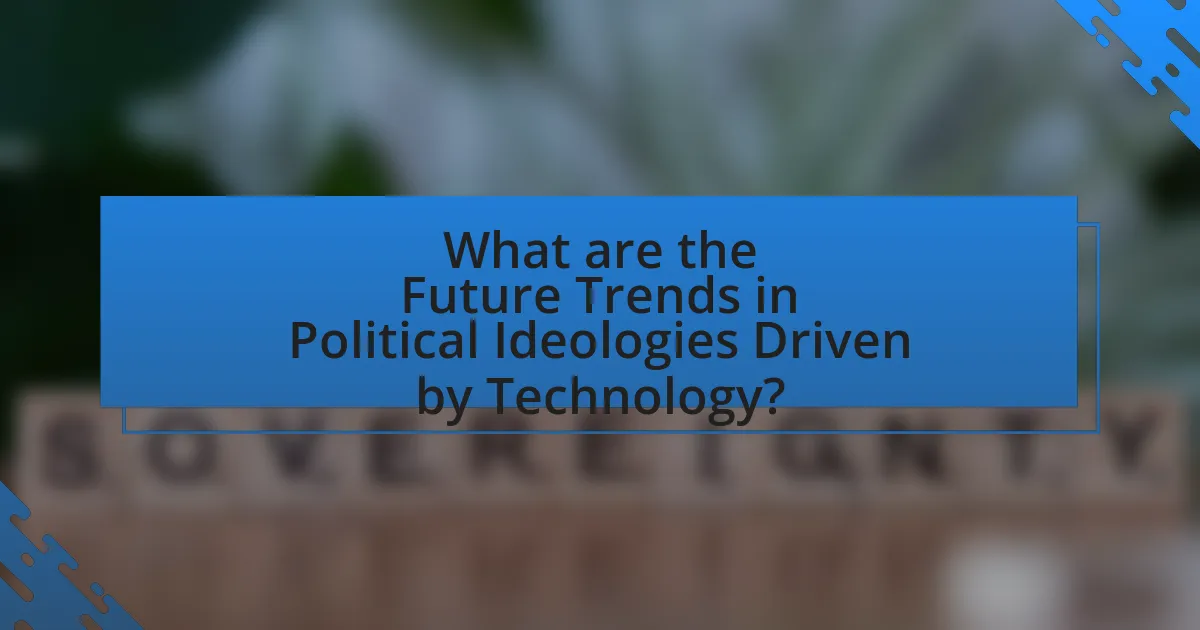
What are the Future Trends in Political Ideologies Driven by Technology?
Future trends in political ideologies driven by technology include the rise of digital populism, increased polarization through social media, and the emergence of data-driven governance. Digital populism is characterized by leaders leveraging social media platforms to mobilize support and bypass traditional media, as seen in recent electoral campaigns worldwide. Increased polarization occurs as algorithms curate content that reinforces existing beliefs, leading to echo chambers and divisive political landscapes. Data-driven governance is gaining traction as governments utilize big data and AI to inform policy decisions, enhancing efficiency but raising concerns about privacy and surveillance. These trends reflect a significant shift in how political ideologies are formed and expressed in the digital age.
What potential political ideologies may emerge in the next decade?
Potential political ideologies that may emerge in the next decade include technocracy, eco-socialism, and digital democracy. Technocracy advocates for governance by experts in technology and science, reflecting the increasing reliance on data and technology in decision-making processes. Eco-socialism combines environmentalism with socialist principles, addressing climate change and social inequality through collective ownership and sustainable practices. Digital democracy emphasizes the use of technology to enhance citizen participation and transparency in governance, leveraging digital platforms for direct engagement. These ideologies are shaped by current global challenges such as climate change, technological advancement, and demands for greater political participation.
How might environmental technology influence green political movements?
Environmental technology significantly influences green political movements by providing innovative solutions that enhance sustainability and mobilize public support. For instance, advancements in renewable energy technologies, such as solar and wind power, empower green political movements to advocate for policies that reduce reliance on fossil fuels, thereby addressing climate change. According to the International Renewable Energy Agency, the global renewable energy sector employed over 11 million people in 2018, demonstrating the economic viability of green technologies and strengthening the argument for green policies. Additionally, environmental technology facilitates grassroots organizing through digital platforms, enabling movements to reach wider audiences and coordinate actions more effectively. This combination of technological innovation and public engagement reinforces the objectives of green political movements, making them more influential in shaping environmental policy.
What role could virtual reality play in political engagement and activism?
Virtual reality can significantly enhance political engagement and activism by creating immersive experiences that foster empathy and understanding. By allowing users to step into the shoes of others, virtual reality can simulate the experiences of marginalized communities, making the challenges they face more tangible. For instance, studies have shown that virtual reality experiences, such as those depicting the realities of refugees or social injustices, can lead to increased emotional responses and a greater likelihood of taking action, as evidenced by research from the University of Southern California, which found that participants who experienced VR simulations were more inclined to support related causes. This technology can also facilitate virtual town halls and protests, enabling broader participation regardless of geographical limitations, thus democratizing access to political discourse.
How can societies adapt to the changing political landscape influenced by technology?
Societies can adapt to the changing political landscape influenced by technology by embracing digital literacy and fostering inclusive dialogue. Digital literacy equips citizens with the skills to critically evaluate information, which is essential in an era of misinformation and rapid technological change. For instance, studies show that increased digital literacy correlates with higher civic engagement and informed voting behavior. Additionally, fostering inclusive dialogue through platforms that encourage diverse perspectives can help bridge divides and promote understanding among different political ideologies. Research indicates that societies that prioritize open communication and collaboration are more resilient to political polarization, as seen in countries that have successfully navigated technological disruptions while maintaining social cohesion.
What strategies can be employed to foster healthy political discourse in the digital age?
To foster healthy political discourse in the digital age, strategies such as promoting media literacy, encouraging diverse viewpoints, and implementing platform accountability can be employed. Media literacy initiatives educate individuals on identifying misinformation and understanding the nuances of political arguments, which is crucial in an era where false information spreads rapidly. Encouraging diverse viewpoints allows for a more comprehensive understanding of political issues, as exposure to different perspectives can reduce polarization. Additionally, implementing platform accountability measures, such as algorithm transparency and content moderation policies, can help mitigate the spread of harmful rhetoric and create a safer online environment for discourse. These strategies collectively contribute to a more informed and respectful political dialogue in the digital landscape.
How can education systems prepare future generations for evolving political ideologies?
Education systems can prepare future generations for evolving political ideologies by integrating critical thinking, civic education, and digital literacy into their curricula. Critical thinking equips students to analyze and evaluate diverse political perspectives, fostering open-mindedness and adaptability. Civic education provides foundational knowledge about democratic principles, governance, and the importance of civic engagement, which is essential in a rapidly changing political landscape. Digital literacy ensures that students can navigate and assess information from various online sources, helping them discern credible information from misinformation. Research indicates that students exposed to these educational components are better prepared to engage with and respond to shifting political ideologies, as seen in studies conducted by the Center for Information & Research on Civic Learning and Engagement, which highlight the positive correlation between civic education and political participation among youth.
What are best practices for engaging with political ideologies in an age of technology?
Best practices for engaging with political ideologies in an age of technology include fostering open dialogue, utilizing diverse platforms for discussion, and promoting critical thinking. Open dialogue encourages the exchange of ideas and perspectives, which is essential in a polarized environment. Utilizing diverse platforms, such as social media, blogs, and podcasts, allows for broader reach and engagement with various demographics. Promoting critical thinking helps individuals analyze information critically, reducing the impact of misinformation. Research indicates that exposure to multiple viewpoints can enhance understanding and tolerance, as shown in studies by the Pew Research Center, which highlight the importance of diverse media consumption in shaping political opinions.
